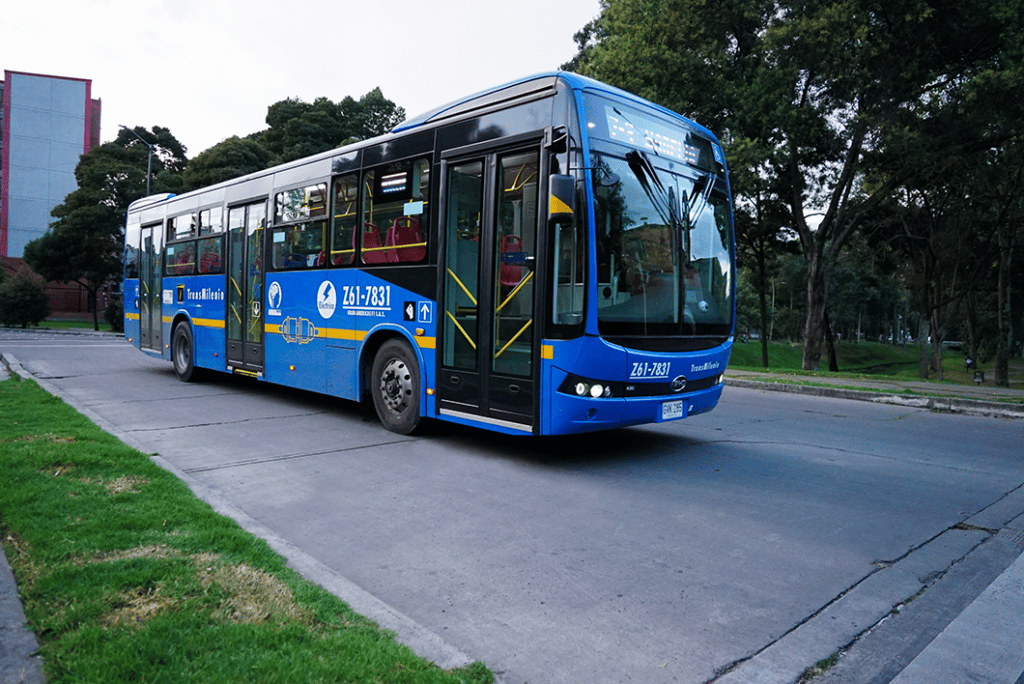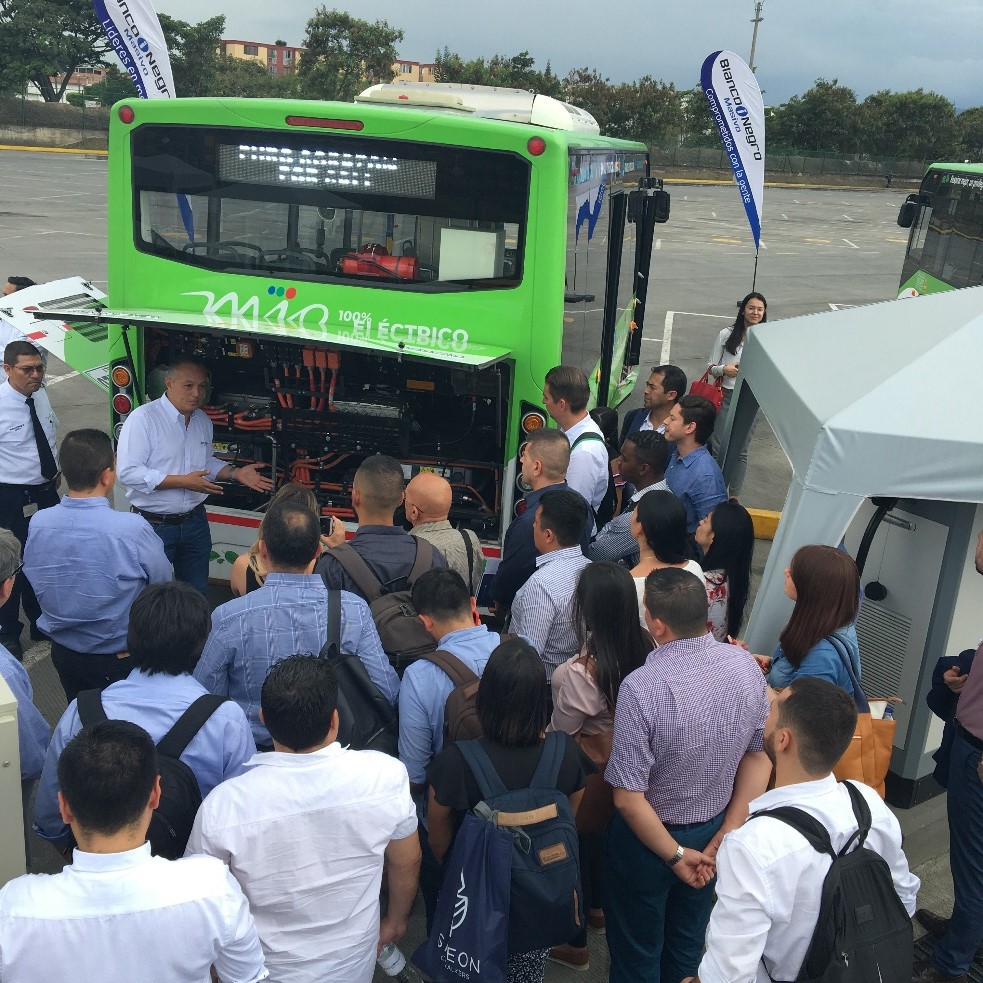
This article is part of our #StoriesofChange where we profile the work of our partner countries in developing climate actions in transport. Read more #StoriesOfChange and follow the Hashtag on Twitter.
With the support of GIZ, the Colombian Ministry of Transportation and Learning National Service, are committed to the technical training of women and men to drive and operate electric bus fleets.
The main cities of Colombia have strengthened their public transportation by betting on e-mobility. During the last three years, the main Colombian cities have integrated many e-buses into their fleets; hence, Bogota integrated 879 buses, Medellin 69 buses, and Cali 36, showing significant progress regionally.
This rapid increase supposes a challenge hence achieving large electric buses deployment requires building enough human capacities to drive and operate these vehicles. Accordingly, maintenance services and driving skills will have to progressively turn their focus on electric technologies to cover the growing demand.

The new conditions also suppose an excellent opportunity to close gender gaps at the operational levels of the transport sector by opening participation options for women throughout a value chain traditionally dominated by men, which is vital since lately, the Colombian National Administrative Department of Statistics, DANE, has called into attention the low access to economic and employment opportunities for women all over the Colombian Economy.
According to DANE, during the first quarter of 2021 (January – March), unemployment among women reached 21% in comparison to 12%, while the values for the same period in 2020 were 16.4% and 9.8%, respectively, showing that the pandemic’s effects over women employment were more critical than for men.
Considering that the transition to mass electric mobility could become an employment booster, aligning public policies and resources could lead to a significant generation of new jobs with high female participation. A strategy to reach these goals must consider:
Accordingly, the project TRANSfer III in Colombia sponsored by BMUV, structured a capacity-building component called “Employability with a gender perspective in transportation” to establish the training programs and strategies for e-buses technicians and operators, including a strong gender perspective following a dual approach:
To meet this goal, GIZ supported the Ministry of Transportation with a consultancy study led by the firms Fundación Despacio and K@pta to design a technicians and operators training program with a gender-inclusive strategy for public transportation systems. The ministry and GIZ formed a strategic alliance with the National Learning Service of Colombia – SENA to include in their curriculum and employability platform the content necessary to train technicians on e-mobility, focusing on improving women’s job access.
Elizabeth Ortiz – Sector Dynamizer of SENA’s Curriculum Management Group, says that the consultancy was able to identify the local gaps in electromobility training with a gender equity approach by reviewing and learning from international experiences while considering the local market requirements and potential demand.
“SENA has training centers that handle electric technology at the level of light duty vehicles. At buses level, there has been an approach to companies that so far has only translated into a shallow immersion by instructors into the subject. So far SENA does not have programs designed for transit vehicles. That is the next step starting from with the results from working with GIZ”.
Elizabeth Ortiz – Sector Dynamizer of SENA’s Curriculum Management Group
SENA does not currently include in its training plans the repair and operation of electric buses. Therefore, is strategic to work with partners such as fleet operators, OEMs, and Management Entities, to acquire new technical knowledge to form instructors that could replicate knowledge and act as multipliers. This strategy will guarantee that the contents taught will be those required by the productive sector.
The curriculum proposed by the project is divided into different levels of training according to the experience and participant’s competences:
On gender equity, Paula Pinilla, Adviser, at the Ministry of Transportation, highlights that the consultancy is relevant for the sector because the Ministry’s sectoral gender committee seeks to close gender gaps, especially in women’s employability.
The consultancy helped identify the difficulties women face in entering the electric mobility value chain and propose actions to overcome these barriers of access and permanence, organizational and environmental barriers, among others, to be implemented jointly by the National Government and strategic allies.
“The consultancy identified organizational, environmental, personal, access, and permanence barriers for women employability on electro mobility. This was an essential learning experience because it is not enough to make huge calls for women to operate or drive the electric buses, but to think about the permanence of these women ensuring the compatibility within their personal lives and work routines”.
Paula Pinilla, Gender and Differential Approach Advisor at Environmental Affairs and Sustainable Development Group. Colombian Ministry of Transportation.

The lessons learned from the consultancy are that beyond convening women for this type of training, motivational strategies should be generated, with the support of the Presidential Council for Women’s Equity, the district and municipal women’s secretaries and the municipal mayors’ offices, in order to motivate and accompany women to participate in sectors and areas of work traditionally assigned to men and contribute to the transformation of stereotypes and achieve the effective enjoyment of rights and economic autonomy.
The training of women and men in electromobility will allow the massification of public transportation systems based on this technology to mitigate greenhouse gases and comply with the NDC from the transportation sector in line with the Sustainable Development Goals, especially Goal 5 – Gender Equality, 11 – Sustainable Cities and Communities and 13 – Climate Action.
The TRANSfer project is implemented by GIZ and funded by the International Climate Initiative (IKI) of the German Federal Ministry for the Environment, Nature Conservation and Nuclear Safety.
 Public transportation bus in Bogotá, Colombia
Public transportation bus in Bogotá, Colombia

Alejandro Ceballos
alejandro.ceballos@giz.de
If you believe that you suffer (potential) negative social and/or environmental consequences from IKI projects, or wish to report the improper use of funds, to voice complaints and seek redress, you can do so using the IKI Independent Complaint Mechanism.